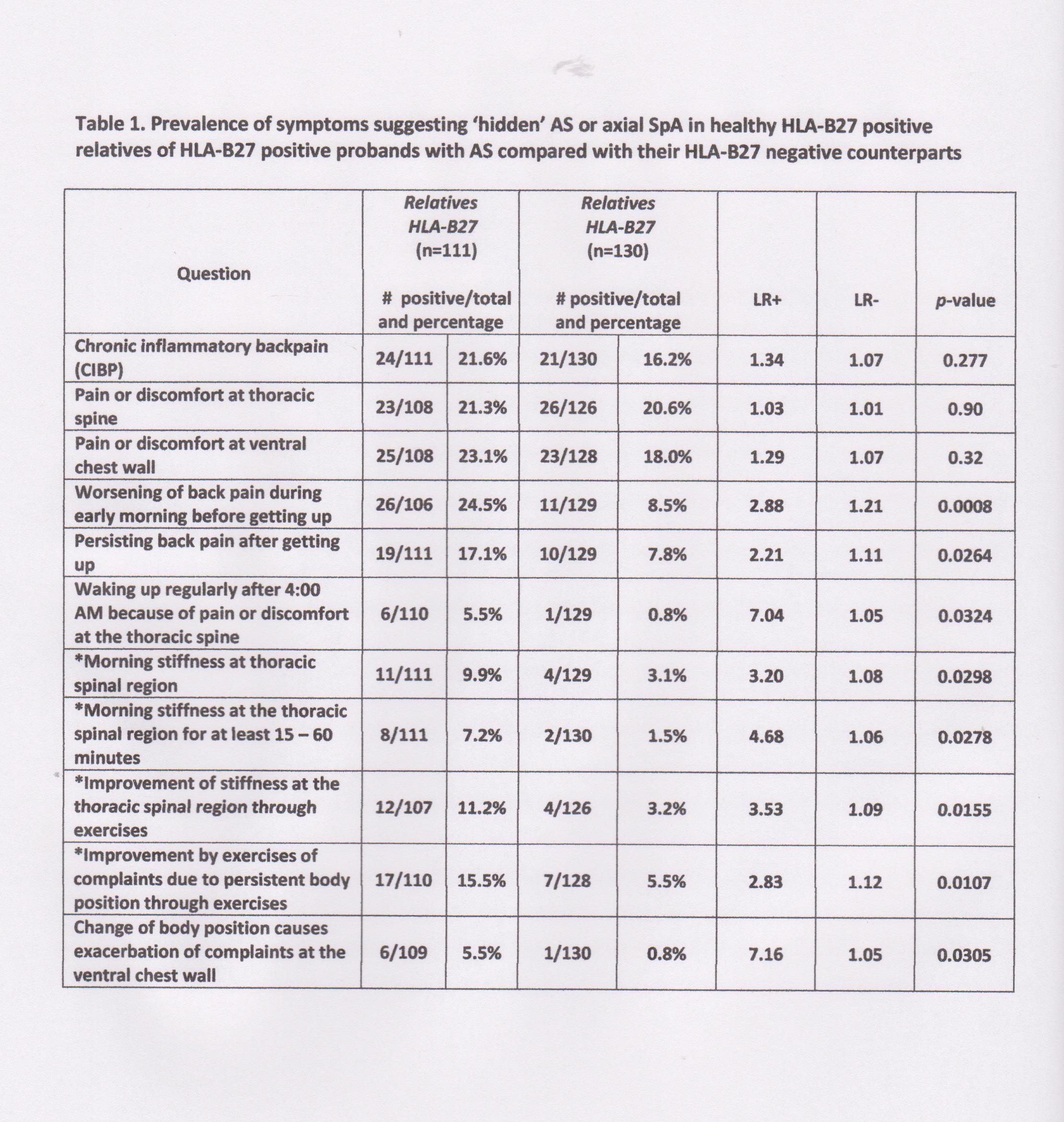Session Information
Date: Monday, November 9, 2020
Session Type: Abstract Session
Session Time: 12:00PM-12:50PM
Background/Purpose: Familial occurrence of ankylosing spondylitis (AS) is well known. Our follow-up study aimed at assessing the incidence of clinically defined AS among first degree relatives (FDR) and to explore ‘hidden’ manifestations of axial spondyloarthritis (axSpA) among ‘healthy’ FDR.
Methods: Our cohort study started in 1985 when the Swiss Ankylosing Spondylitis Patient Society member patients clinically diagnosed with AS were contacted to participate in this study, together with their FDR, irrespective of whether they were known to have any disease. After ethical approval and Informed consent, 1178 subjects completed questionnaires on disease manifestations, underwent rheumatological examination of axial and peripheral joints, and provided blood samples for genetic studies, including HLA-B27. Pelvic radiographs of 363 probands and 713 FDR were assessed blindly for presence of sacroiliitis according to the New York (NY) radiographic criteria.
In 2018 the ethical committee of the Swiss Kanton of Bern approved the follow up study. City and village administrations provided current addresses of former participants. 124 Probands and 338 FDR were available for follow-up and were screened by questionnaire.
Results: First study (1985): 308 of 358 HLA-tested AS probands were HLA-B27(+) (86.0%). The mean age of the 672 FDR (311 males) was 26.9± 8.2 years. At that time 14 (7 males) of the 308 HLA-B27(+) FDR (4.5%) had sacroiliitis and met the mNY criteria for AS (mean age 33.5 ± 4.1 years). In contrast, none of the 278 HLA-B27(-) FDR of HLA-B27(+) probands showed sacroiliitis (p=0.00032), nor did anyone of the 83 HLA-B27(-) FDR of 50 HLA- B27(-) probands (p= 0.048). Considering FDR of probands with a clinical diagnosis of AS in the absence of sacroiliitis (now called non-radiographic axSpA (nr-axSpA)), two of the 59 HLA-B27(+) FDR (3.4%) of 58 HLA-B27(+) nr-axSpA probands themselves had AS, compared with none of 47 HLA-B27(-) FDR of 28 HLA-B27(-) nr-axSpA probands (p=0.50).
In 2019, 36 of 152 (23.7%) HLA-B27(+) FDR reported themselves to have AS, including 6 of the 14 FDR who already met mNY criteria in 1985. In contrast, amongst HLA-B27(-) FDR only 3 of 173 HLA-B27(-) (1.7%) FDR reported themselves to have AS (odds ratio 18, p=1.2×10-9). The current mean age of the 39 FDR is 58.4 ± 8.7 years.
Considering ‘inflammatory’ spinal arthritis symptoms assessed by questionnaire, eight of these were reported significantly more often by HLA-B27(+) than HLA-B27(-) FDR, in the absence of any rheumatic disease diagnosis (Table 1). These items individually have low sensitivity with low negative likelihood ratios, but are highly specific with high positive likelihood ratios. Interestingly, 8 of 111 (7.2%) HLA-B27(+) FDR share 4(*) items compared with 2 of 130 HLA-B27(-) FDR (1.5%) (odds ratio=5.0, p= 0.028). This points to ‘hidden’ AS/axSpA manifestations among HLA-B27(+) FDR.
Conclusion: For HLA-B27(+) FDR the risk of developing AS/axSpA over a period of more than 35 years is substantial (23.7%). This confirms our previous finding of a 21% risk figure in a Dutch family study (Arthritis Rheum 1984; 27:241). It is unlikely that the life-time incidence will increase further given the age of the cohort.
To cite this abstract in AMA style:
van der Linden S, Villiger P, Li Z, Brown M, Baumberger H, Zandwijk H, Khan M. Substantial Lifetime Risk of Developing Ankylosing Spondylitis (Axial Spondyloarthritis) for Relatives. Evidence from a 35-Year Follow-up Family Study of a Swiss Cohort [abstract]. Arthritis Rheumatol. 2020; 72 (suppl 10). https://acrabstracts.org/abstract/substantial-lifetime-risk-of-developing-ankylosing-spondylitis-axial-spondyloarthritis-for-relatives-evidence-from-a-35-year-follow-up-family-study-of-a-swiss-cohort/. Accessed .« Back to ACR Convergence 2020
ACR Meeting Abstracts - https://acrabstracts.org/abstract/substantial-lifetime-risk-of-developing-ankylosing-spondylitis-axial-spondyloarthritis-for-relatives-evidence-from-a-35-year-follow-up-family-study-of-a-swiss-cohort/

